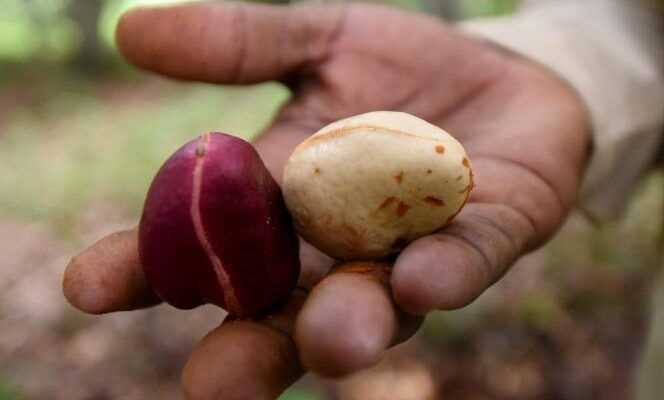Slumped in a chair in front of his store, cigarette in the corner of his mouth and “Misbaha” (the Muslim rosary) in his right hand, Ibrahim Keïta does not really look like a businessman. But appearances can be deceiving. His phone rings, he answers then stands up and distributes his instructions to the employees who are busy around him. “Prepare ten bags [de 50 kg] for Senegal, ten for Gambia, fifteen for Mauritania and thirty for Burkina ”, he orders, crushing his butt under his foot. In a few minutes, this slender man with a hesitant gait ensured the supply of cola nuts to most of the countries of West Africa.
Trader since 1983, Ibrahim Keïta is today at the head of the most important collective of exporters in Anyama, a small town located north of Abidjan, on the historic axis that connects the Ivorian economic capital to the Sahel countries. . Together, they export more than 70,000 tonnes of cola nuts each year, or nearly a quarter of national production, which amounted to around 280,000 tonnes in 2019, according to professionals. Côte d’Ivoire is the world’s main producer of cola seed, ahead of Nigeria. True baron of the sector, Ibrahim Keïta has been on the front line when it has been carried away in recent years. “In 1995, the country produced only 60,000 tonnes, and in 2012, 192,000 tonnes”, he blurted out, still surprised. Today, this culture generates an annual turnover estimated by industry experts at 100 billion CFA francs (around 152 million euros).
Before Anyama became “The world capital of cola”, Ibrahim Keïta explains that “Everything was informal and artisanal: we produced in the surroundings and we sent small volumes to our parents in the north of Côte d’Ivoire, in Mali and in Burkina, because there the consumption of nuts is cultural”. Even today, in many communities in West Africa, especially in the Sahel, the nut is offered in dowry, marriage, baptism and sacrifice ceremonies.
A product that has remained confidential for a long time
Ibrahim Keïta only keeps a few bags for his personal use, before sending his trucks beyond the borders. Likewise, 90% of Ivorian production is exported to countries in the sub-region, three quarters of which go to Nigeria. The West African giant, producer and large consumer, sells part of it abroad.
Cola has long remained a confidential product, far from the radar of the Ivorian and global economy. It is difficult to find a place on the podium of cash crops when the first place has been occupied for almost half a century by cocoa, followed by coffee, rubber, cashew and cotton. But today, with the explosion in demand, the industry is getting organized and the players are emerging from the shadows. In 2017, the Intercola was born, an inter-professional association that brings together producers, traders, exporters and processors under one banner.
A welcome professionalization for certain sectors, attracted by the virtues attributed to the cola nut. The pharmaceutical industry is particularly interested in its composition because “It is a euphoric and aphrodisiac product, an appetite suppressant, a powerful astringent, an antioxidant and a diuretic”, explains Dr Henri Biego, consultant in food security and executive director of Intercola. This nut lover, who consumes them ” every morning “, recalls that the extracts of cola, whose color varies from red to creamy white through pink and yellow, are also of interest to the textile industry, in particular “That of the loincloth, which uses it for coloring”.
According to this specialist, the recent structuring of the sector also aims to better serve the agri-food industry, in particular specialists in so-called colated soft drinks. Because if their recipes are kept secret, the names of the giants Coca-Cola and Pepsi-Cola betray the main ingredient that makes the success of these drinks. Its high caffeine content – “3% against 2% in coffee”, says Dr. Biego – seduces producers of stimulating and energy drinks. These brands hardly communicate on their Ivorian or sub-regional supply, no doubt because traceability has long been lacking. Without being able to guarantee the origin of products to consumers, they relied for a long time on subcontractors or went to Jamaica, where the first colatiers were planted by slaves in the 17th century.e century.
Yield increases with the age of the tree
The craze for this culture is “Moving the lines”, analysis Mamadou Doucouré, president of an association of producers. This is the case upstream of the chain, where cola is increasingly attracting Ivorian cocoa producers. “Before, they were hardly interested in the colatiers they had on their fields, but since the demand increases, they understood the interest and the profitability of this crop which lends itself to several harvests in the year”, explains Mr. Doucouré. Importantly, the yield increases as the tree ages (it can live 100 years). If cola remains an additional crop for Ivorian planters, a new trend is emerging nonetheless. Ten years ago, only 15% of cola producers practiced monoculture. Today, that figure has risen to 30%, says Intercola, whose goal is to reach 50% within five years.
Still, cola still suffers from a major handicap: its price. In the absence of a regulatory tool, the product remains speculative and small producers weigh little in the face of pressure from traders. A professional in the sector recalls that in 2020, the year of the pandemic, the price could have ranged from 50 to 600 CFA francs / kg, “Sometimes in the same village”. “Patience”, recommends Henri Biego, convinced that in the medium term, a “National farm gate price” will be announced annually by the authorities. Only then will the sector have entered the heart of the major Ivorian cash crops.
